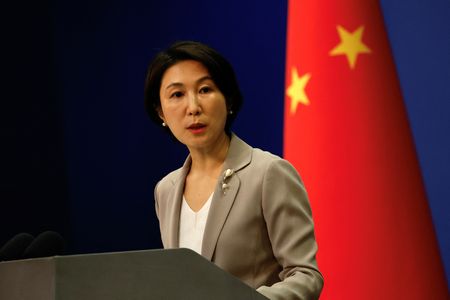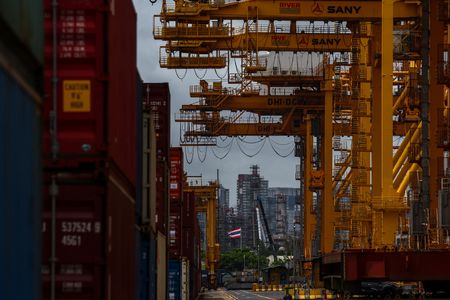By Andreas Rinke and Sarah Marsh
BERLIN (Reuters) -Germany’s Economy Ministry recommends excluding using components from providers from authoritarian states in critical infrastructure and imposing stricter requirements for firms dealing with China, a strategy paper seen by Reuters shows.
Those German firms particularly exposed to China should share details on that business with the government and undergo regular stress tests, according to the ministry’s “Internal Guidelines on China”, marked confidential.
Reuters had previously reported on some of the measures the economy ministry was considering to curb German reliance on China as the new government refines its relationship with Asia’s rising superpower.
Executives from firms including chemicals giant BASF, Deutsche Bank and industrial group Siemens pushed back on the government’s plans in a call with Economy Minister Robert Habeck in September, Reuters reported, citing sources.
The companies declined to comment at the time. Any new plan would still have to be approved by the coalition partners of Habeck’s Greens party.
Deep trade ties bind Asia and Europe’s biggest economy, with rapid Chinese expansion and demand for Germany’s cars and machinery fuelling German growth over the past two decades.
China became Germany’s single biggest trade partner in 2016.
However, the relationship has come under close scrutiny since Russia’s invasion of Ukraine in February, which led to the curtailment of a decade-long energy relationship with Moscow and caused numerous companies to ditch their local businesses.
The paper seen by Reuters, which totals 104 pages and is dated Nov.
24, appears to detail the latest standpoint and would likely feed into the government’s broader China strategy which it intends to publish next year.
It could extend scrutiny of IT component suppliers from some countries to firms making components for critical infrastructure such as transportation, healthcare or water and food supply.
Berlin should consider checking outbound German investments in Chinese companies if these operated in security-relevant sectors or were suspected of human rights violations, it said.
German development financing for China should be phased out by next year and political support by high-ranking officials for projects there questioned.
The Chinese Foreign Ministry did not immediately respond to a Reuters request for comment outside of business hours.
‘VULNERABLE TO BLACKMAIL’
Germany did not aim to decouple from its top trade partner, China, said the paper, first reported on by online portal The Pioneer.
But Russia’s invasion of Ukraine had shown the high risks of close economic relations with autocratic states seeking alternative world orders.
“The importance of China as an export market for many German industrial sectors as well as critical dependencies in certain … areas could make Germany vulnerable to blackmail and restrict its political capacity to act,” the document said.
German companies should receive more aid to diversify their trade, for example via state export credits for other markets, it said.
Also, the European Union should consider excluding companies from third countries for tenders for especially important projects like in the semiconductor sector.
Volker Treier, trade chief at the German chambers of commerce and industry (DIHK), said the ministry’s paper would make business with China more difficult without showing a way to build new sustainable trade relations.
China’s development is described in the paper as very problematic and further in the direction of systemic rivalry, away from partnership.
This was “evidenced not least by the pro-Russian attitude of China towards the attack on Ukraine”.
The paper underscored the fact the year 2027 was repeatedly mentioned as the year China could invade Taiwan.
The Economy Ministry is led by Habeck of the Greens, who have long warned of the risks of being overreliant on China.
The paper still has to be approved by Chancellor Olaf Scholz’s Social Democrats and the liberal FDP, coalition partners in Germany’s government.
SPD parliamentarian Isabel Cademartori told Reuters that everyone in the German government agreed that Europe’s biggest economy needed to reduce its dependence on China.
“But we should not start a game of moral one-upmanship for who will call for the clearest words and toughest measures,” she said, adding that a change in Berlin’s China policy would have extremely big consequences for Germany’s medium-sized companies, the backbone of its economy.
(Additional reporting by Christian Kraemer and Ryan Woo; Writing by Sarah Marsh, Paul Carrel and Maria Sheahan; Editing by Raissa Kasolowsky, Mark Potter, Sandra Maler, Philippa Fletcher, William Maclean)












